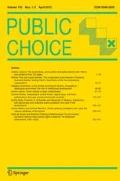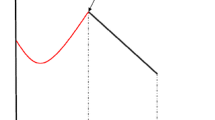Abstract
Real-world simple plurality elections rarely bear out the strong Duvergerian prediction that, in equilibrium, only two competitors receive votes. Recent advances in strategic voting theory demonstrate that voter uncertainty about competitors’ true support levels in the constituency may lead to limited strategic voting, and hence incomplete desertion of trailing parties. This is the first attempt to estimate empirically the impact of uncertainty on incentives to vote strategically. Calibrating a model of strategic voting to voting results from simple plurality elections in German constituencies, it is found that strategic voters operate under high levels of uncertainty. These results support the proposition that uncertainty about party support impedes formation of Duvergerian equilibria.
Similar content being viewed by others
References
Abramson, P. R., Aldrich, J. H., Blais, A., Diamond, M., Diskin, A., Indridason, I. H., Lee, D. J., & Levine, R. (2010). Comparing strategic voting under FPTP and PR. Comparative Political Studies, 43, 61–90.
Alvarez, M. R., & Nagler, J. (2000). A new approach for modelling strategic voting in multiparty elections. British Journal of Political Science, 30, 57–75.
Alvarez, M. R., Boehmke, F. J., & Nagler, J. (2006). Strategic voting in British elections. Electoral Studies, 25, 1–19.
Austen-Smith, D. (2000). Redistributing income under proportional representation. Journal of Political Economy, 108, 1235–1269.
Bargsted, M., & Kedar, O. (2009). Coalition-targeted Duvergerian voting: how expectations affect voter choice under proportional representation. American Journal of Political Science, 53(2), 307–323.
Bawn, K. (1999). Voter responses to electoral complexity: ticket splitting, rational voters and representation in the federal republic of Germany. British Journal of Political Science, 29, 487–505.
Black, J. H. (1978). The multicandidate calculus of voting: application to Canadian federal elections. American Journal of Political Science, 22, 609–638.
Blais, A., & Nadeau, R. (1996). Measuring strategic voting: a two-step procedure. Electoral Studies, 15, 39–52.
Blais, A., Young, R., & Turcotte, M. (2005). Direct or indirect? assessing two approaches to the measurement of strategic voting. Electoral Studies, 24, 163–176.
Blais, A., Aldrich, J. H., Indridason, I. H., & Levine, R. (2006). Do voters vote for government coalitions? Testing Downs’ pessimistic conclusion. Party Politics, 12, 691–705.
Cain, B. E. (1978). Strategic voting in Britain. American Journal of Political Science, 22, 639–655.
Cain, B. E., Ferejohn, J. A., & Fiorina, M. P. (1984). The constituency service basis of the personal vote for U.S. representatives and British members of parliament. American Political Science Review, 78, 110–125.
Chhibber, P., & Kollman, K. (1998). Party aggregation and the number of parties in India and the United States. American Political Science Review, 92(2), 329–42.
Cox, G. W. (1994). Strategic voting under the single nontransferable vote. American Political Science Review, 88, 608–621.
Cox, G. W. (1997). Making votes count: strategic coordination in the world’s electoral systems. Cambridge: Cambridge University Press.
Cox, K. E., & Schoppa, L. J. (2002). Interaction effects in mixed-member electoral systems: theory and evidence from Germany, Japan, and Italy. Comparative Political Studies, 35(9), 1027–1053.
Cox, G., & Shugart, M. S. (1996). Strategic voting under proportional representation. Journal of Law, Economics and Organization, 12, 299–324.
Diwakar, R. (2007). Duverger’s law and the size of the Indian party system. Party Politics, 13, 539–561.
Felsenthal, D. S., Rapoport, A., & Maoz, Z. (1988). Tacit cooperation in three-alternative non-cooperative voting games: a new model of sophisticated behaviour under the plurality procedure. Electoral Studies, 7, 143–161.
Fey, M. (1997). Stability and coordination in Duverger’s law: a formal model of preelection polls and strategic voting. American Political Science Review, 91, 135–147.
Fisher, S. L. (1973). The wasted vote thesis: West German evidence. Comparative Politics, 5, 293–299.
Fisher, S. D. (2004). Definition and measurement of tactical voting: the role of rational choice. British Journal of Political Science, 34, 125–166.
Forsythe, R., Myerson, R. B., Rietz, T. A., & Weber, R. J. (1993). An experiment on coordination in multi-candidate elections: the importance of polls and election histories. Social Choice and Welfare, 10, 223–247.
Forsythe, R., Rietz, T. A., Myerson, R. B., & Weber, R. J. (1996). An experimental study of voting rules and polls in three-candidate elections. International Journal of Game Theory, 25, 355–383.
Gaines, B. J. (1999). Duverger’s law and the meaning of Canadian exceptionalism. Comparative Political Studies, 32, 835–861.
Galbraith, J. W., & Rae, N. C. (1989). A test of the importance of tactical voting. British Journal of Political Science, 19, 126–136.
Gelman, A., & King, G. (1990). Estimating incumbency advantage without bias. American Journal of Political Science, 34(4), 1142–1164.
Grofman, B., Chiaramonte, A., D’Alimonte, R., & Feld, S. L. (2004). Comparing and contrasting the uses of two graphical tools for displaying patterns of multiparty competition. Party Politics, 10, 273–299.
Grofman, B., Blais, A., & Bowler, S. (Eds.) (2009). Studies in public choice: Vol. 13. Duverger’s law of plurality voting. The logic of party competition in Canada, India, the United Kingdom and the United States. Berlin: Springer.
Gschwend, T. (2007). Ticket-splitting and strategic voting under mixed electoral rules: evidence from Germany. European Journal of Political Research, 46, 1–23.
Gschwend, T., Johnston, R., & Pattie, C. (2003). Split-ticket patterns in mixed-member proportional election systems: estimates and analyses of their spatial variation at the German federal election, 1998. British Journal of Political Science, 33, 109–27.
Hainmueller, J., & Kern, H. L. (2008). Incumbency as a source of spillover effects in mixed electoral systems: evidence from a regression-discontinuity design. Electoral Studies, 27, 213–227.
Herrmann, M., & Pappi, F. U. (2008). Strategic voting in German constituencies. Electoral Studies, 27, 228–244.
Hoffman, D. T. (1982). A model for strategic voting. SIAM Journal on Applied Mathematics, 42(4), 751–761.
Johnston, R. J., & Pattie, C. J. (1991). Tactical voting in Great Britain 1983 and 1987: an alternative approach. British Journal of Political Science, 21, 95–108.
Katz, J. N., & King, G. (1999). A statistical model for multiparty electoral data. American Political Science Review, 93, 15–32.
King, G., Tomz, M., & Wittenberg, J. (2000). Making the most of statistical analyses: improving interpretation and presentation. Amercan Journal of Political Science, 44, 341–355.
Levitt, S. D., & Wolfram, C. D. (1997). Decomposing the sources of incumbency advantage in the U.S. House. Legislative Studies Quarterly, 22, 45–60.
McKelvey, R. D., & Ordeshook, P. C. (1972). A general theory of the calculus of voting. In J. Herndon & J. Bernd (Eds.), Mathematical applications in political science (pp. 32–78). Charlottesville: University of Virginia Press.
Moser, R. G., & Scheiner, E. (2005). Strategic ticket-splitting and the personal vote in mixed-member electoral systems. Legislative Studies Quarterly, 30, 259–276.
Myatt, D. P. (2007). On the theory of strategic voting. Review of Economic Studies, 74(1), 255–281.
Myatt, D. P., & Fisher, S. D. (2002). Everything is uncertain and uncertainty is everything. Department of Economics Discussion Paper No. 115. University of Oxford.
Myerson, R. B., & Weber, R. J. (1993). A theory of voting equilibria. American Political Science Review, 87, 102–114.
Niemi, R. G., Whitten, G., & Franklin, M. N. (1992). Constituency characteristics, individual characteristics and tactical voting in the 1987 British General Election. British Journal of Political Science, 22, 229–247.
Ordeshook, P. C., & Zeng, L. (1997). Rational voters and strategic voting: evidence from the 1968, 1980 and 1992 elections. Journal of Theoretical Politics, 9, 167–187.
Palfrey, T. R. (1989). A mathematical proof of Duverger’s law. In P. C. Ordeshook (Ed.), Models of strategic choice in politics (pp. 69–91). Ann Arbor: University of Michigan Press.
Pappi, F. U., & Thurner, P. W. (2002). Electoral behaviour in a two-vote system: incentives for ticket splitting in German Bundestag elections. European Journal of Political Research, 41, 207–32.
Persson, T., Roland, G., & Tabellini, G. (2007). Electoral rules and government spending in parliamentary democracies. Quarterly Journal of Political Science, 2, 155–188.
Powell, B. (2000). Elections as instruments of democracy. Majoritarian and proportional visions. New Haven: Yale University Press.
Reed, S. R. (1990). Structure and behaviour: extending Duverger’s law to the Japanese case. British Journal of Political Science, 20, 335–356.
Reed, S. R. (1999). Strategic voting in the 1996 Japanese general election. Comparative Political Studies, 32, 257–270.
Rietz, T. A., Myerson, R. B., & Weber, R. J. (1998). Campaign finance levels as coordinating signals in three-way experimental elections. Economics and Politics, 10, 185–217.
Roberts, G. K. (1988). The “second-vote” campaign strategy of the West German Free Democratic Party. European Journal of Political Research, 16, 317–337.
Schoen, H. (1999). Split-ticket voting in German federal elections, 1953–1990: an example of sophisticated balloting? Electoral Studies, 18, 473–496.
Shikano, S., Herrmann, M., & Thurner, P. W. (2009). Strategic voting under proportional representation: threshold insurance in German elections. West European Politics, 32, 630–652.
Statistisches Bundesamt (various years), Die Wahlbewerber fnr die Wahl zum Deutschen Bundestag, SFG, Servicecenter Fachverlag.
Upton, G. J. G. (1994). Picturing the 1992 British General election. Journal of the Royal Statistical Society, 157, 231–252.
Warwick, P. V. (1994). Government survival in parliamentary democracies. Cambridge: Cambridge University Press.
Author information
Authors and Affiliations
Corresponding author
Rights and permissions
About this article
Cite this article
Herrmann, M. Voter uncertainty and failure of Duverger’s law: an empirical analysis. Public Choice 151, 63–90 (2012). https://doi.org/10.1007/s11127-010-9734-2
Received:
Accepted:
Published:
Issue Date:
DOI: https://doi.org/10.1007/s11127-010-9734-2




